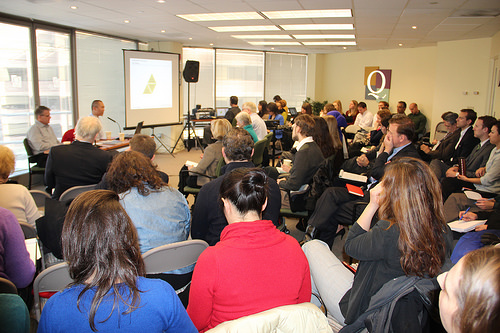New Research Offers Lessons for Enterprises Seeking to Scale Up

Over the past year, Monitor Deloitte has conducted field research on more than 400 inclusive businesses across Africa and India seeking to understand what the common barriers to scale are, how these barriers can be overcome with innovative business models, and what funders and intermediaries can do at the outset to help address and remove barriers to scale. The first MPEP Seminar of the new year entitled Overcoming Barriers to Scale to Reach the Poor featured Kurt Dassel and Harvey Koh of Monitor Deloitte's Regional Economic Competitiveness (REC) and Monitor Inclusive Markets (MIM) units in a discussion on identifying and mitigating challenges to developing commercially viable and scalable enterprises. The event also offered a sneak preview of their firm's upcoming research publication.
As with other firms, donors, and non-governmental actors, the presenters explained that Monitor Deloitte's dilemma was not how to develop a sound model—as there is a huge proliferation of viable models operating at very small scale—but rather how to get the models to grow. Of the 400 inclusive businesses studied in Africa and India, only 140 enterprises were promising; and of those, only 59 were commercially viable and operating at scale. But why were less than 15 percent of the impact enterprises viable?
Dassel and Koh began by sharing the common challenges most impact enterprises face when attempting to scale. Findings from the recent publication include:
- Many of the business models are fundamentally unsound from the outset and require iterative refinement to prepare for scale.
- Enterprises typically face multiple, tough barriers to scaling, which include both enterprise and market ecosystem challenges, that can evolve and grow as the models scale. Few business models address both enterprise and ecosystem barriers which makes scale-up difficult. Since the models do not work in a vacuum, a strong enabling environment is essential.
- Finally, the risk-averse nature of impact investors creates "Pioneer Gap." Impact investors are predominately interested in growth and target low-risk businesses already in the process of scaling. The Pioneer Gap then leaves new models that have not yet proved they are commercially viable require additional funding and support to test out their models to reach scale.
The presenters then discussed two case studies of market-based solution models in east Africa. Vodacom's mobile money service in Tanzania launched in 2008 and faced initial disappointing service uptake with fewer than 300,000 users in its first 14 months. Kenya's smallholder tea producer began as a parastatal in the 1960's and weathered decades of change and turmoil to become the second largest tea exporter in the world. Dassel and Koh highlighted the lessons learned from working alongside enterprises attempting to scale.
- Not all barriers to scale rest at the firm level. A lack of investment, capacity, leadership, and technical skills all contribute to challenges the enterprise faces.
- Gaps in the value chain can inhibit growth. Examples of these challenges can include difficulty with distribution, financing, and customers who do not have access to adequate cash capital to purchase the product. All of these factors can contribute to businesses being commercially viable in one, small location but are unable to grow.
- New models often face barriers to growth due to a lack of understanding of how, where, or when to grow. These businesses benefit from greater support and funding and often become commercially viable.
- Customer awareness of the businesses new product is key. Poor products often saturate the market making it difficult for better products to gain traction. Regular, targeted communication with a model's primary consumer base can help to alleviate this market share problem.
- Market or industry facilitation by a donor, foundation, non-governmental actor, or local government working alongside firms can often help unlock barriers to scale.
So how have these key considerations influenced Monitor Deloitte's work with businesses? Dassel and Koh offered four themes that emerged from the research to better develop commercially viable impact enterprises:
- Get the model right. While the ecosystem is essential to the strength of the enterprise's ability to scale, building off of a sound business model is primary.
- Facilitation is helpful. Support from intermediaries, donors, or other actors can often help to create an enabling environment for scale.
- It takes leadership. Enterprises need committed, innovative leadership at the system and industry level who are willing to testing new models.
- It takes money. Funding for direct facilitation for public goods in the market often requires significant investment to break value chain barriers and overcome deadlocks.


